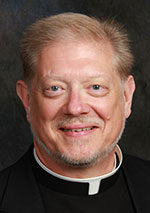That All May Be One / Fr. Rick Ginther
Jesus’ life, death and resurrection is for all humanity
 My last two columns centered on the variety of world religions. Each column was based upon what I learned from the Catholic Association of Diocesan Ecumenical and Interreligious Officers’ (CADEIO) Interreligious Institute earlier this year.
My last two columns centered on the variety of world religions. Each column was based upon what I learned from the Catholic Association of Diocesan Ecumenical and Interreligious Officers’ (CADEIO) Interreligious Institute earlier this year.
Part of what I attempted to share was that we are a world of human beings. We have various cultures arising in various eras of history. We grasp for meaning based in what was handed on to us, and we seek the transcendent.
There are some common truths and values within various religions. These arise from God’s Spirit, according to Catholic understanding.
But there are two questions for which Christians and Catholics expect answers: Are all religions equal? Do we still hold that “there is no salvation outside the Church”?
To answer the first: all religions, so long as they support the good of humanity and promote the common good, are to be equally respected. They seek to enter into the divine, the transcendent. They seek to connect our daily human purpose to ultimate purpose.
But they are not the same (equal). (Hold onto that thought for a moment.)
To answer the second question: “salvation outside the Church” has been a topic for debate throughout Christian history.
One era gave a resounding response of “no.” Another qualified the “no” with a nod to “the mystery of God’s mercy.”
Still another pondered the question as it faced the “New World.” It wondered about all those who had never known the Church or Jesus.
Finally, the great schism of 1053 (East /West) and the Protestant Reformation (1517 and beyond) raised the question of who was “in the Church” and “who was out of the Church.”
Various Christian denominations heralded themselves as “the Church,” hurling anathemas and recriminations against one another.
The Second Vatican Council helped in answering the question for our time based on the inherited wisdom of tradition.
The “Dogmatic Constitution on the Church” (“Lumen Gentium,” #14-16) makes clear that those baptized into Christ Jesus as Catholic are indeed fully a part of the Church. It then states that those who believe and are baptized into Christ, yet do not fully profess the beliefs of the Church, are linked to the Church.
“Lumen Gentium” further states that those who have not yet received the Gospel are related in various ways to the people of God. These include Jews, Muslims and other religions. Even those who sincerely seek the divine but have never heard of Jesus Christ can attain to salvation.
It is this latter statement that takes us back to my earlier “more in a moment.”
Jesus Christ is the source of salvation for all human beings. That is what makes Christianity unique. That is what makes the Church the sacrament of salvation. It is Jesus Christ.
We proclaim this as our mission message.
“For God so loved the world that he sent his only Son into the world, not to condemn the world, but that the world might be saved through him” (Jn 3:16).
His life, death and resurrection—the full paschal mystery—are for all humanity. We do not exclude anyone from that hope.
Yes, we embrace with respect the diversity of religions. We acknowledge the elements of truth within them. We share with them common aspirations and values: peace, justice, human dignity.
Together we accept the goodness of creation, that it has a purpose and is ultimately linked to the transcendent.
What makes us unique among many is that we are rooted in the Incarnate One, the Word made flesh, Emmanuel, God with us: Christ Jesus. We trace our roots directly to him through his Apostles.
Obediently, we proclaim him.
(Father Rick Ginther is director of the archdiocesan Office of Ecumenism and Interreligious Affairs. He is also the pastor of Our Lady of Lourdes Parish, Indianapolis.) †
 My last two columns centered on the variety of world religions. Each column was based upon what I learned from the Catholic Association of Diocesan Ecumenical and Interreligious Officers’ (CADEIO) Interreligious Institute earlier this year.
My last two columns centered on the variety of world religions. Each column was based upon what I learned from the Catholic Association of Diocesan Ecumenical and Interreligious Officers’ (CADEIO) Interreligious Institute earlier this year.